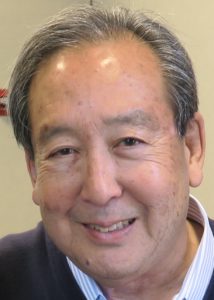Home
 Samuel Yamashita is the Henry E. Sheffield Professor of History at Pomona College, where he has taught since 1983. He received his PhD in Japanese history at the University of Michigan in 1981 and was a postdoctoral fellow at the Reischauer Institute of Japanese Studies at Harvard University and a senior tutor in East Asian studies there before he moved to Pomona. He teaches Asian history at Pomona, and his introductory Asian history class, Asian Traditions, a survey of Chinese, Japanese, and Korean history from prehistory to 1500, is one of the most popular classes at the college. A well regarded teacher, he has won Pomona College’s Wig Distinguished Teaching Award six times (1986, 1990, 1995, 2001, 2006, 2011) and in 2012 was included in The Princeton Review’s list of The Best 300 Professors. In addition, he has been chair of the history department and coordinator of the Asian studies program, the oldest college-level program of its kind in the United States.
Samuel Yamashita is the Henry E. Sheffield Professor of History at Pomona College, where he has taught since 1983. He received his PhD in Japanese history at the University of Michigan in 1981 and was a postdoctoral fellow at the Reischauer Institute of Japanese Studies at Harvard University and a senior tutor in East Asian studies there before he moved to Pomona. He teaches Asian history at Pomona, and his introductory Asian history class, Asian Traditions, a survey of Chinese, Japanese, and Korean history from prehistory to 1500, is one of the most popular classes at the college. A well regarded teacher, he has won Pomona College’s Wig Distinguished Teaching Award six times (1986, 1990, 1995, 2001, 2006, 2011) and in 2012 was included in The Princeton Review’s list of The Best 300 Professors. In addition, he has been chair of the history department and coordinator of the Asian studies program, the oldest college-level program of its kind in the United States.
In 2020 the Association for Asian Studies named him to their Distinguished Speakers Bureau for a three-year term (2021-2024), and he will be available to give four lectures—“Vendettas and the Tokugawa Order,” “Understanding Daily Life in Wartime Japan, 1937-1945,” “Did the War with Japan Have To End In the Way It Did?” and “The Cultural Significance of the ‘Japanese Turn’ in Fine Dining in the United States, 1980-2020.”
A Confucian specialist with mastery of both classical Chinese and classical Japanese, Yamashita has written extensively on early modern and modern Japanese intellectual and cultural history, and his first book, Master Sorai’s Responsals, a translation of Ogyū Sorai’s Sorai sensei tōmonsho, was published by the University of Hawai’i Press in 1995. He also is the cotranslator of The Four–Seven Debate: An Annotated Translation of the Most Famous Controversy in Korean Neo-Confucian Thought (State University of New York Press, 1993), which makes the fascinating correspondence of two leading sixteenth-century Korean Confucian philosophers available to an English-reading public.
His recent publications include a short interpretive history of Asian studies at liberal arts colleges, “Asian Studies at American Private Colleges, 1808–1990,” which appeared in Asia in the Undergraduate Curriculum: A Case for Asian Studies in Liberal Arts Education (M.E. Sharpe, 2000), and an essay on a star-crossed Japanese American baseball team—“The Aloha Team, 1942–1943”—which is included in More Than a Game: Japanese Americans and Sports (Japanese American National Museum, 2000). His “War and Ethnicity in the Study of Modern Japan,” a personal and historiographic memoir on the modern Japanese history field, can be found in Japan in the World / The World in Japan (University of Michigan Press, 1999).
In the 1990s, recognizing the dearth of primary source material pertaining to the Pacific War that he could use in his courses on modern Japan, Yamashita began to collect letters and diaries written by ordinary Japanese during the war. As he read them, he found that life on the home front as recorded in these personal documents was not well represented in the existing English-language literature on the war. Instead, these diaries challenge the prevailing view of a unified and patriotic Japanese citizenry and raise questions about the way the war ended with the dropping of two atomic bombs. From his collection of more than one hundred and sixty diaries by Japanese adults, servicemen, teenagers, and children, he has read and translated nearly sixty-five. Eight of these diaries were published as Leaves from an Autumn of Emergencies: Selections from the Wartime Diaries of Ordinary Japanese (University of Hawai’i Press, 2005; currently in its third printing). Since the fall of 2005, he has given book talks all over the country, was interviewed by Scott Simon (National Public Radio) and Kitty Felde (KPCC, Pasadena), and has used the diaries and memoirs he collected to write Daily Life in Wartime Japan, 1940-1945, a history of life on the home front in wartime Japan, which was included in the University Press of Kansas’s Modern War Series.
He recently completed Hawai’i Regional Cuisine: The Food Movement That Changed the Way Hawai’i Eats, the first book-length study of the origins, development, cuisine and legacy of this important regional cuisine movement that appeared in the University of Hawai’i Press’s Food in Asia and the Pacific series. It is based on interviews with thirty-six chefs, farmers, retailers, culinary arts instructors, and food writers as well as on nearly everything written about the HRC chefs in the local and national media. And his article “The ‘Japanese Turn’ in Fine Dining in the United States, 1980-2020” appeared in the summer 2020 issue of Gastronomica.